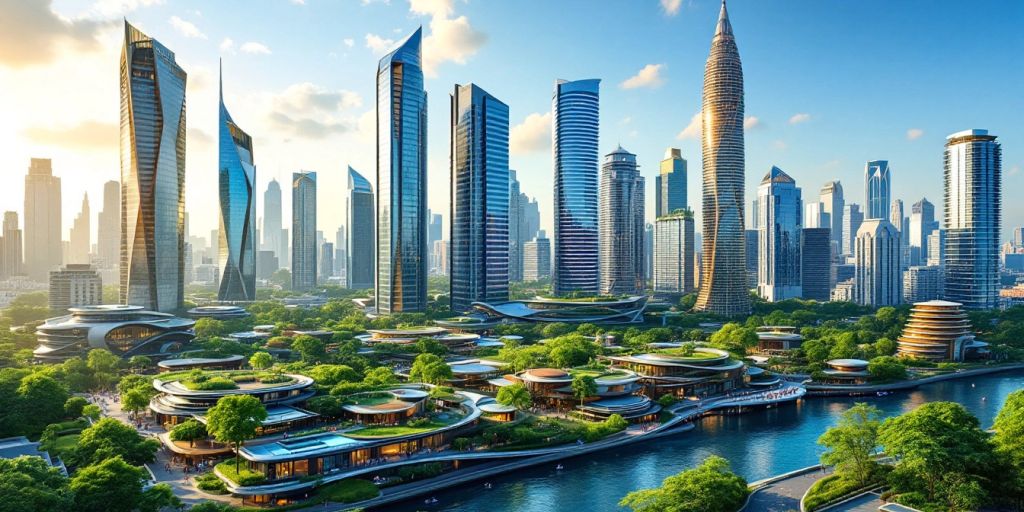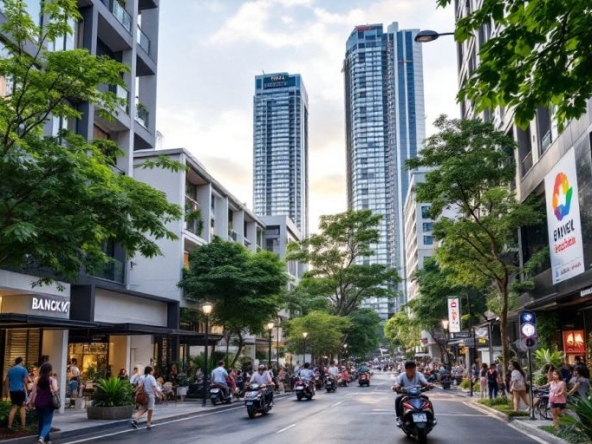Thailand’s real estate market is undergoing a significant transformation, driven by emerging trends that reflect changing demographics and lifestyle preferences. With a market valued at approximately USD 2 trillion, the sector is adapting to the needs of multigenerational families, the rise of semi-retirement lifestyles, and the hybridisation of hospitality and residential spaces.
Key Takeaways
- Multigenerational Living: A growing trend where families across generations cohabit, influencing property design and location preferences.
- Semi-Retirement Lifestyle: Increasing numbers of individuals favouring phased retirement, leading to demand for properties that accommodate both work and leisure.
- Hospitality-Residence Hybridisation: A shift towards mixed-use developments catering to both residential and tourism needs, particularly in urban areas.
Multigenerational Living
The concept of multigenerational living is gaining traction in Thailand, with 34% of households currently comprising multiple generations. This trend is expected to rise as the elderly population grows. Developers are responding by designing homes that allow for flexibility and future expansion, catering to the diverse needs of family members.
Key considerations include:
- Accessibility: Homes must accommodate older generations, necessitating features like wider doorways and fewer obstructions.
- Location Preferences: Younger generations prioritise proximity to workplaces, while families with children seek safe neighbourhoods with quality schools.
Semi-Retirement Lifestyle
As Thailand’s population ages, retirement patterns are evolving. A recent study indicates that 66% of younger generations prefer a phased approach to retirement, often continuing to work part-time. This shift is creating a demand for residential properties that support both work and leisure activities, as well as integrated healthcare facilities.
Hospitality-Residence Hybridisation
The influx of international visitors to cities like Bangkok and Phuket is reshaping the use of residential properties. Many are transitioning from primary residences to secondary homes for vacationing, prompting a rise in mixed-use developments. These developments not only provide living spaces but also incorporate retail and office areas, catering to a diverse clientele.
Growth in Logistics and Warehousing
In addition to residential trends, Thailand’s logistics property market is also evolving. The total supply of ready-built warehouses has increased by 6.3% in the second half of 2023, reaching 5.7 million square metres. This growth is primarily driven by the e-commerce sector and third-party logistics (3PL) providers, despite a slight slowdown in growth due to external geopolitical factors.
Key statistics include:
- Bangkok Metropolitan Region (BMR): Holds 45% of the total warehouse market.
- Eastern Economic Corridor (EEC): Accounts for 38% of the overall supply, with Chonburi leading at 25%.
The Impact of the Electric Vehicle Industry
Thailand’s burgeoning electric vehicle (EV) industry is projected to significantly influence the commercial real estate sector, with an estimated market value of USD 6.5 billion by 2030. The government’s 30@30 policy aims for 30% of all vehicles produced to be electric, driving demand for specialised real estate to support manufacturing and research.
Key developments include:
- Investment: USD 1.8 billion attracted from major players like BYD and Japanese automakers.
- Manufacturing Needs: A requirement for over 34 GWh of EV batteries by 2030, necessitating new manufacturing facilities.
Conclusion
Thailand’s real estate market is at a pivotal point, adapting to the needs of a changing demographic landscape. With trends like multigenerational living, semi-retirement lifestyles, and the hybridisation of residential and hospitality spaces, the sector is poised for significant growth. Additionally, the rise of the EV industry further underscores the importance of specialised real estate in supporting economic development.
As these trends continue to evolve, stakeholders in the real estate market must remain agile and responsive to the shifting demands of consumers and investors alike.
Sources
- 3 Trends Transforming Thailand’s Real Estate, Realty Plus Magazine.
- Thailand ready-built warehouses increase by 6.3% in H2 2023 | Real Estate Asia, Real Estate Asia.
- Thailand’s USD 6.5 Billion EV Industry Set to Power Commercial Real Estate Growth – Construction & Property News, Construction & Property News.




